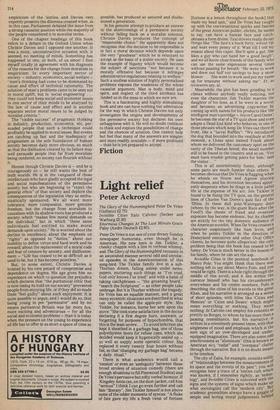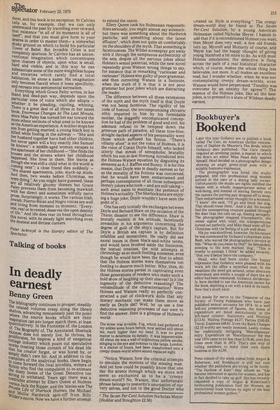Fiction
Light relief
Peter Ackroyd
The Glory of the Hummingbird Peter De Vries (Gollancz £2,75)
Invisible Cities Italo Calvino .(Secker and Warburg £2.50)
Enormous Changes At The Last Minute Grace Paley (Andre Deutsch £2.95).
Peter De Vries is not one of your dreary Sunday newspaper humorists, even though he is American. His new hero is Jim Tickler, a cheeky chappie with a line in verbose whimsy, and The Glory of the Hummingbird recounts in an astonished manner several odd and unrelated episodes in the Americanisation of this song-bird. The Tickler family live in a subThurban dream, falling asleep under neevspapers, muttering such things as "I've tried, God only knows I've tried" and with a habit of taking catchphrases — "the groaning board," "search the Scriptures" — as other people take umbrage. But it is Thurber without the tragedy: De Vries has an equable manner, and a great many eccentric situations are described in what can only be called the apple-pie style. Mrs Tickler, for instance, burns her arm upon the stove: "She took some satisfaction in the doctor declaring it a first degree burn, unaware, or forgetting for purposes of hypochondria, that this is the least severe ... To avoid Infection she kept it sheathed in a garbage bag, one of those polyethylene liners for refuse cans, which she decided would keep it hygenically sealed up — as well as supply some operatic colour, She replaced it every twenty four hours without fail, so that 'changing my garbage bag' became a daily ritual."
There is what academics would call a 'tension' or even an 'ambiguity' between these broad strokes of situation comedy (there are enough situations to fill Pinewood Studios) and De Vries's pervasive but nifty verbal humour. If Kingsley Amis can, on the dust-jacket, call him "serious" I think I can go even further and call him "literary". Jim Tickler himself is not above some of the odder moments of syntax: "A fluke of fate gave my life a fresh twist of fortune [fortune is a lemon throughout the book] that made my head spin," and De Vries has caught up with the conversational quirks and fancies of the great American public; clichés, he seems to say, can have a human face and catchphrases a form divine. Taxi drivers really do say things like "The fare's a buck forty, witout tip, and wurt every penny of it. Wait till I tell my missus about this caper. She'll split a gut. She likes a guy who can hand her a good laugh", and we all know close friends of the family who can use the same expression several times without pausing for breath: "He went to work and drew out half our savings to buy a snow blower. . She went to work and put my name up for treasurer without asking me". Et, as reviewers say, al.
Meanwhile, the plot has been grinding to a climax without anybody really noticing, not even the characters. Jim Tickler marries the daughter of his boss, as if he were in a novel, and becomes an advertising copywriter by coming up with names for his products like 'the intelligent man's porridge — Joyce Carol Oates'; he becomes the star of a TV quiz show and even adopts a Dead End kind who behaves, in one of those phrases which keep De Vries out there in front, like a "larval Raffles": "We introduced the dog that bounded into the vestibule at that moment, a Lhasa apso named Frank about whom we delivered the customary spiel on the rarity of the Tibetan breed, the small number still to be found in the country and so on. 'You must have trouble getting parts for him,' said the visitor. ..."
This is all intermittently funny, although some parts are much funnier than others. It becomes obvious that De Vries is flagging when he wheels on Nixon and Agnew playing themselves, and his invention becomes apparently desperate when he drags in a little pallid life at the expense of his art: Jim Tickler is found to be fixing the TV quiz, on the general lines of Charles Van Doren's quiz fizz of the 'fifties. In these dull post-Watergate days (where, by the way, is the giant Race after the Food?) the theme of fraud and eventual exposure has become endemic, but its charms are strictly for the tiny domestic audience of the American novelist. When De Vries creates a character suspiciously like Sam Irvin, and ‘ when he points Tickler in the direction et Disneyland executives and other Oval Office clowns, he becomes quite allegorical: the onlY problem being that the book has ceased to be funny. De Vries is much better in the bosom of his family, where he can act the asp.
Invisible Cities is the poetical notebook of Marco Polo. You might think that there was nothing left to say about Marco Polo, and you would be right. There is a hole right through the middle of this novel, and it lies within the narrator himself who has his circumference everywhere and his centre nowhere. Polo is describing the cities of his travels to the great Khan, and his narrative is arranged as a series of short episodes, with titles like 'Cities and Memory' or 'Cities and Desire' which might mean everything or nothing. They mean nothing. Sr Calvino can employ his conceits as prettily as Borges, to whom he has more than a passing resemblance, but his narrative ls written in a relentlessly present tense, with that singleness of mood and emphasis which is the, sure sign of an over-developed and underequipped imagination. There are also some edd anachronisms as "aluminum" (this is known as American sic), "radar" and "overpass" clatter through the narrative. But it is no doubt meant to be timeless. The city of Zaira, for example, consists solelY of "relationships between the measurements of, its space and the events of its past"; you will recognise here a trace of a 'sixties cult which was known, if I remember rightly, as `selni°logy', and Invisible Cities is concered with the signs and the systems of signs which make uP what sociologists call the 'modern city'. But, academic generalities always have a gaggle simple. and boring moral judgements behillu
them, and this book is no exception: Sr Calvino tells us, for example, that we can only understand the past by travelling ever onward, that existence "in all of its moments is all of itself", and that you must give form to your desires in order to master them— a somewhat shaky ground on which to build his particular Tower of Babel. But Invisible Cities is not completely spurious. Sr Calvino has an unconventional imagination which concentrates Upon clusters of objects, upon what is small, hard and visible, and in this way he can substantiate some of the more weightless hopes and anxieties which rarely find a local habitation, let alone a name. His imagination only becomes flaccid when it loses specificity, and retreats into sentimental surrealism.
Everything which Grace Paley writes, inher bland and dead-pan way, depends upon the Particular tone of voice which she adopts — Whether it be pleading, cajoling, whining. There is a great deal of all three in her latest book, Enormous Changes At The Last Minute, since Miss Paley has turned her ear toward the more ethnic sections of what used to be known as the American experience. A mother stops her sOn from getting married; a young black boy is killed while fooling in the subway — "She and her husband together have had other children, but never again will a boy exactly like Samuel be known"; a middle-aged woman escapes to the apartment of her childhood — "She finds the houses and the streets where her childhood happened. She lives in them. She learns as though she was still a child what in the world is coming next"; a close friend dies suddenly — We shared apartments, jobs, stuck-up studs. And then, two weeks before Christmas, we were dying.". As you might have guessed, these are all relatively gloomy themes but Grace Paley prevents them from becoming mawkish with her direct and sometimes wilfully naive Prose. Surprisingly, it works. The various Irish, Jewish, Puerto-Rican and Negro voices are well and living from moment to moment: "Everyone, real or invented, deserves the open destiny Of life." And life does rear its head throughout this novel, with its steady light searching even the dustiest and dirtiest corners.
Peter Achroyd is the literary editor of The Spectator.



































 Previous page
Previous page